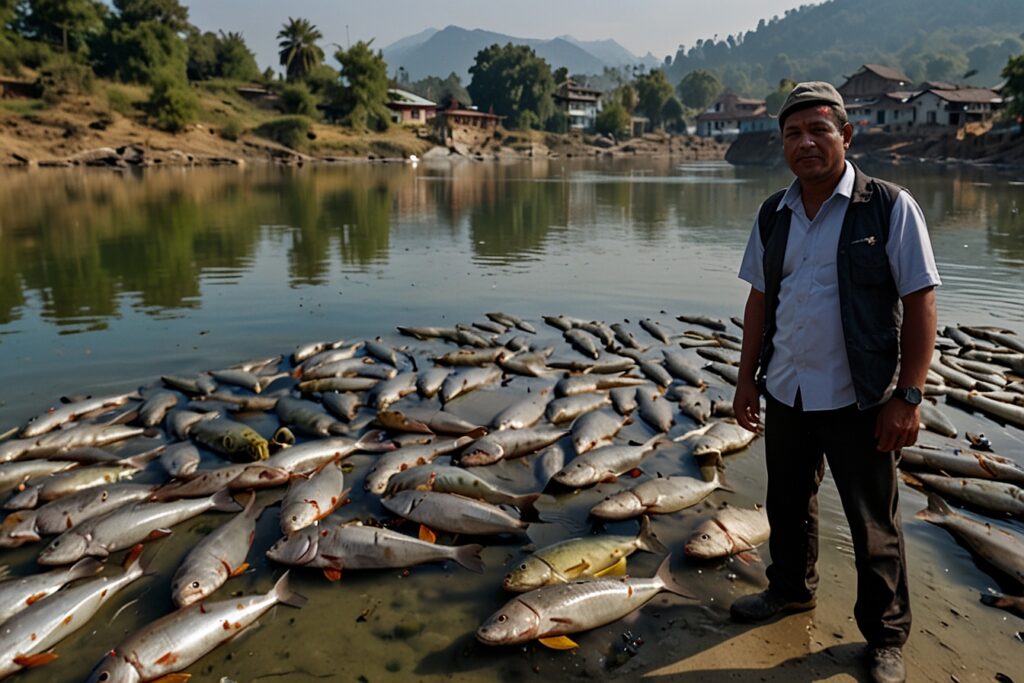Many Nepali fish farmers are struggling to deal with this menace because Indian fish farmers are dumping inferior fish products into Nepal market to put Nepali fish farmers out of business, out-competing local fish farmers. It has deteriorated to what farmers in many regions including Urlabari have described as disastrous and they have been appealing to government to come to their aid.
The poor quality fish, mostly smuggled from India, has increased competition and made the environment difficult for Nepali farmers. Such fish imports, which may sell at prices lower than locally produced fish, do not undergo such requirements and standards as those for locally produced fish. This has also created a fall in demand for locally produced fish by farmers, leading to most of the Nepali farmers finding it hard to market their produce profitably.
Veteran journalist of the district, Hari Prasad Koirala, added that the effect of this phenomenon is much higher in the district that is famous for fish farming. Local farmers have developed incredible investments in aquaculture that have adopted new trends in aquaculture infrastructure and methodology, and what they are experiencing now is a great loss. Most have borrowed to start their farm and the present market situation has made it almost impossible for them to repay their loans.
It is not just an economic problem. There are increasing concerns with regard to food safety and assurance. Fish smuggled into the country may not have to passed through the health and safety requirements appropriate for domestic species and therefore may be dangerous for human consumption. To this we add a public health component, which turns an already formidable economic problem into an even mightier one.
Local authorities and farmer associations are urging the government to tighten border control and crack the whip on imported products. They opine that the situation is detrimental to individual farmer and goes against the government’s aim of making Nepal a fish seed producing country. They have recently gained momentum to promote the importation of fish and these illegals are likely to reverse the gains made towards the development of the sector.
The books also raise questions about the issues that Nepalese agriculture is likely to face in the future. With the country now progressively seeking to become more industrialized meets this challenge of an open border with India and the regional market issue. Striking a balance between an affordable source of food and shelter of local producers is always a Herculean challenge among policymakers.
The government is being called upon by farmers to take several actions related to the situation. These include, strict border checkpoints checks, stiff penalties on smugglers, and assistance to affected farmers. Some also urge the Ministry to launch information campaigns to persuade people to buy fish produced in the country instead of imported products of low quality.
The fish farming crisis comes at a time when Nepal is experiencing several economic problems. As it will be recalled, the country’s tourism industry, which is among the essential components of the economic growth, is experiencing issues because of airports and expensive ticket rates. These discharging influences integrate more pressure on the government to identify the integrated solutions that affect different sectors at once.
What more becomes clear as the situation progresses is the fact that the elimination of the sealed box containing the dept of fisheries’ illegal fish import is not easily accomplished. It’s not just about regulating the borders, but one is also about improving the efficiency of Nepali fish farmers. This may require spending in efficient methods of farming, enhancement of logistics, and relationships of markets for our domestic producers.
The next few weeks will be decisive because farmers, local governments, and the central government will be looking for a solution. This crisis could have great consequences for policy in Nepalese agriculture and the general outlook on food security. It is sad that while the country is struggling to find its way in the operation of a modern fashioned economy and forging complex regional trade relations, its fish farmers continue to undergo hardship.


